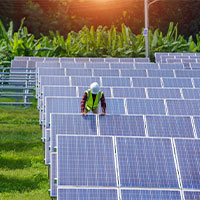Cost of solar panels in Florida
How much is it to go solar in 2023?

The average cost to install solar panels is $20,367 in Florida, after the federal solar investment tax credit (ITC), which makes going solar in the Sunshine State about 15% cheaper than the national average. The out-of-pocket investment might be lower compared with other states, but your total lifetime savings are also lower (thanks to Florida’s net metering regulations).
Key insights
- The average cost per watt is $2.53.
- If you pay cash, the average payback period is 12 years.
- Over 25 years, the average net savings is $21,500.
How much do solar panels cost in Florida?
Installing a residential solar energy system can cost between $10,000 to $30,000 or more, though individual costs vary significantly. You can get set up with solar panels for less than $20,000 after rebates and incentives in Florida. Large systems can cost significantly more — one solar energy customer we talked to, Norberto in St. Cloud, said he paid $70,000 for his solar energy system.
The average household in Florida needs approximately an 11.5-kilowatt (kW) system to fully meet energy demands ($2.53 x 11,500 W = $29,095).
Average cost by system size in Florida
| 9 kW | 10 kW | 11 kW | 12 kW | 13 kW | 14 kW | 15 kW | |
|---|---|---|---|---|---|---|---|
| Before federal tax credits | $22,770 | $25,300 | $27,830 | $30,360 | $32,890 | $35,420 | $37,950 |
| After federal tax credits | $15,939 | $17,710 | $19,481 | $21,252 | $23,023 | $24,794 | $26,565 |
| Approximate roof size | 1,350 sq. ft | 1,500 sq. ft. | 1,650 sq. ft. | 1,800 sq. ft. | 1,950 sq. ft. | 2,100 sq. ft. | 2,250 sq. ft. |
How much can I save going solar in Florida?
“A solar system is a great way to save money on our electric bill,” Kim in West Palm Beach said. “Our first full month’s electric bill was 85% less than our annual monthly average.”
James in Orlando also told us his solar system has saved him money and that his bill is “zero.”
Many other Florida residents go solar for the financial benefits, but their experiences vary. For instance, Ronald in St. Augustine was happy with the installation and left a positive review last year.
When we followed up in July 2023, he said that “there has not been any saving so far” because of Florida Power & Light’s recent rate increases and the increase in his homeowners insurance premium.
I’m not a big tree-hugger guy, but you can see the writing on the wall. ”
Steve in Venice also went solar last year. He told us he’s happy with the panels’ performance; they consistently produce more energy than he needs. However, like Ronald, he’s unhappy with the recent changes in FPL’s net metering policy.
Steve said he has to sell excess energy to the grid wholesale but pays retail rates if he ever needs to source electricity. “It’s almost like I’m paying for extra kilowatt hours that they are selling to their customers,” he said.
Steve said he produces a surplus of 675 kilowatt-hours (kWh), but FPL charges a $25 minimum monthly fee. According to FPL, the $25 minimum is a fixed base charge (for metering, billing and customer service, plus producing and delivering electricity) that excludes fuel and other costs.
The more energy you use, the lower your minimum base bill charge. So, it’s practically impossible for Steve to achieve a $0 monthly energy bill.
“The idea behind it is great,” he said. “It's also a money-grab for the power companies.”
He’s still glad he went solar for environmental reasons. “I’m not a big tree-hugger guy,” Steve said, “but you can see the writing on the wall.”
His system cost $34,000 overall. He made an $8,800 down payment and now pays $123 per month on the loan (his interest rate is only 1.5%). He expects his monthly bills to stabilize at around $150, significantly lower than he was paying before going solar (he said his earlier bills were up to $350).
He sees the long-term cost savings, irrespective of potential future increases in kWh rates, as a significant advantage, provided the power company doesn't interfere.
Cost factors of going solar in Florida
How much you pay for your solar panels depends on a range of factors, including the size of your system and the quality of your panels.
Solar costs include system components (such as panels and inverters), permit expenses for compliance, design for optimal sunlight exposure, labor for safe installation, possible grid energy payments when demand exceeds generation, and maintenance to ensure peak performance.
Panel efficiency
Solar panels have varying efficiency ratings, which means that some panels can produce more electricity than others of the same size. On average, solar panel efficiency is between 15% and 20%.
If you have a small roof or limited space, it may be better to buy panels with higher efficiency ratings to generate more power with your available space. However, if space is not a problem, you might find it more cost-effective to install more lower-efficiency panels.
Florida averages 3.5 to 4.5 peak sun hours a day.
Investing in high-quality panels is a good idea: They can save you more money in the long run by generating more power throughout their life span. In simple terms, the higher the efficiency of the panel, the more power it can produce per square foot. This lets you generate the same amount of energy using fewer panels.
» COMPARE: Most efficient solar panels
System size
Before installation, the company installing your system typically performs a site assessment to create a custom system. This helps determine the optimal solar system size for your energy needs.
How many solar panels you need is determined by how much electricity your household uses. The average monthly energy consumption is 1,096 kWh in Florida, according to the Energy Information Administration. Depending on efficiency, it takes around 20 to 30 solar panels to generate approximately 1,000 kWh per month.
No system is 100% efficient, so you must account for losses due to shading, wiring and inverter efficiency.
Condition of your roof
Most solar panels are designed to last 25 years or more, so you want your roof to last at least as long before needing to be replaced. If you live in an older house, you might have to spend extra to repair or replace it before going solar. (Asphalt shingles generally last 20 to 30 years, and metal roofs last a little longer.)
Solar panels typically last 25 years.
Otherwise, you’ll have to pay to remove the panels, repair your roof and reinstall them, which can cost thousands of dollars.
For example, Marie in Port St. Lucie had an issue with a company installing solar panels on an old roof and then having to fix it. The company wanted to charge Marie “$150 per panel to take them down so I can get a new roof and put them back up.”
Other solar cost factors in Florida
- How you pay: You can pay the full price upfront, but many people in Florida finance solar panels. A solar loan works like any other type of loan — there’s an application and approval process, and you pay it back over time (with interest). If you finance, you need to consider the interest as part of your overall cost.
- Local utilities: You might run into fees depending on where you live. For example, Duke Energy and FLP both charge minimum usage fees, even if you aren’t pulling in any electricity from the grid. "
- Home insurance: Some people are surprised that their homeowners insurance goes up after they install solar panels. Trevor in New Port Richey said his general liability policy is at least $700 with solar panels.
Solar incentives, tax credits and rebates in Florida
The federal solar investment tax credit (ITC) is the biggest factor in reducing the cost of going solar in Florida. If you install a residential system by the end of 2032, you can deduct 30% of the system's total cost — including equipment, labor and permits — from your federal taxes. The credit drops to 26% in 2033 and 22% in 2034.
The average ITC value in Florida is $4,644.
Florida residents can also take advantage of several other incentives, including state tax breaks and rebates through some local solar energy companies.
» MORE: Florida solar incentives
Compare solar installation companies in Florida
Supower, Sunrun, Freedom Solar Power and ShopSolar are all highly rated on ConsumerAffairs. Joseph in Port St. Lucie said SunPower makes enrollment “very simple,” but “ShopSolarKits was the best deal,” according to Juan in West Palm Beach. Read our guide to finding the best solar companies to learn more.
| SunPower | Sunrun | Freedom Solar Power | ShopSolar | ||||
|---|---|---|---|---|---|---|---|
| Primary | SunPower | Read reviews | Customer Ratings 4.3 | Free quote | Payment options
Cash, loan, lease
| Warranty
10 to 25 years
| |
| Primary |  | Sunrun | Read reviews | Customer Ratings 4.1 | Free quote | Payment options
Cash, loan, lease
| Warranty
25 years
|
| Primary | Freedom Solar Power | Read reviews | Customer Ratings 4.4 | Free quote | Payment options
Cash, loan, lease, PPA
| Warranty
25 years
| |
| Primary |  | ShopSolar | Read reviews | Customer Ratings 4.7 | Free quote | Payment options
Cash, loan
| Warranty
Varies
|
FAQ
Can I get free solar panels in Florida?
We aren’t aware of a program that gives you solar panels for 100% free in Florida, but some companies might make it seem like you can.
For example, when Mike in St. Petersburg went solar earlier this year, a solar company rep made it sound like there was “no cost for solar power, but it turns out that you just didn't have to pay for installation until you got the first bill.”
“They said there's no upfront cost, which was true,” Mike explained. “I didn't have to pay any money out of pocket until it was installed. Then I had to pay $70,000, and I had to get a loan for it. So, that was very misleading. They should be more open and say, ‘Look, you're trading your electric bill for a bill for the solar panels and the installation of the solar panels. And it's gonna be a lot more than you're gonna pay in the next 25 years.’ “
How can I pay for solar panels?
You can pay cash, but most people finance solar panels. A solar loan works a lot like any other type of loan — there’s an application and approval process, and you pay it back over time (with interest).
If you are considering a solar loan, lease or PPA (power purchase agreement), always ask:
- Is there a down payment?
- How much will I pay per month?
- When will monthly payments increase, and by how much?
Do I need to buy a battery for solar energy storage?
It’s probably a good idea.
“Living in South Florida, power outages are a real issue after a hurricane, so we also included a battery to give us the ability to store power,” a solar customer in West Palm Beach said.
Lithium-ion batteries are the popular option for a solar panel system, though other types can be cheaper.
» FIND: Best solar batteries
Bottom line: Are solar panels worth it in Florida?
The cost-effectiveness of a solar system in Florida varies based on your roof size, orientation, angle and shading. It’s a big upfront investment, but it’s often worth it for environmental benefits and potential savings.
“The main frustration for us was that shortly after we installed,” James in Orlando said. “Duke Energy, who is our electricity provider in Florida, instituted a minimum charge on electric bills, which was frustrating given that that wasn't information that we had known prior nor had expected. So, that impacted how we think about the payback period.”
The average net savings is $21,500 over 25 years.
Still, James emphasized the positive impact of “doing good in the world. We're excited to be doing a small part to help drive towards a greener environment.”
We’ll likely see panels continue to get cheaper. The cost to go solar in Florida has fallen 54% over the last decade, according to the Solar Energy Industries Association.
» STILL NOT SURE? Solar energy pros and cons
Article sources
- EcoWatch, “ Solar Panel Cost in Florida .” Accessed July 29, 2023.
- Office of Energy Efficiency & Renewable Energy, “ Homeowner’s Guide to the Federal Tax Credit for Solar Photovoltaics .” Accessed July 29, 2023.
- Solar Energy Industries Association, “ Florida Solar .” Accessed July 28, 2023.
- EnergySage, “ Solar Panel Cost in Florida .” Accessed July 27, 2023.
- Database of State Incentives for Renewables & Efficiency (DSIRE), “ Florida Programs .” Accessed July 27, 2023.
- Florida Power & Light Company, “ Minimum Base Bill .” Accessed Aug. 2, 2023.
You’re signed up
We’ll start sending you the news you need delivered straight to you. We value your privacy. Unsubscribe easily.
